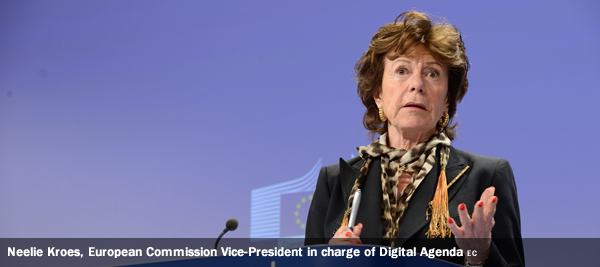In the wake of large-scale Internet surveillance and reduced trust in the internet, the European Commission has proposes a key reform to the way the Internet is managed and run. The proposal calls for more transparent, accountable and inclusive governance.
Commission Vice-President Neelie Kroes said: “The next two years will be critical in redrawing the global map of Internet governance. Europe must contribute to a credible way forward for global internet governance. Europe must play a strong role in defining what the net of the future looks like.”
The Commission is committed to an internet that continues to serve fundamental freedoms and human rights, Kroes noted: “Our fundamental freedoms and human rights are not negotiable. They must be protected online.”
The Commission proposes the establishment of a clear timeline for the globalisation of ICANN and the “IANA functions”; strengthening of the global Internet Governance Forum; launching an online platform for creating transparency on internet policies, the Global Internet Policy Observatory; a review of conflicts between national laws or jurisdictions that will suggest possible remedies; an ongoing commitment to improve the transparency, accountability and inclusiveness of the multi-stakeholder processes and those who participate in these processes; a commitment to creating a set of principles of Internet governance to safeguard the open and unfragmented nature of the Internet; a commitment to globalise key decision-making (for example the coordination of domain names and IP addresses) to safeguard the stability, security and resilience of the Internet.
Kroes said: “Some are calling for the International Telecommunications Union to take control of key Internet functions. I agree that governments have a crucial role to play, but top-down approaches are not the right answer. We must strengthen the multi-stakeholder model to preserve the Internet as a fast engine for innovation.”
The Commission firmly supports a real multi-stakeholder governance model for the Internet based on the full involvement of all relevant actors and organisations; stating that this Communication is a foundation for a common European approach in global negotiations, such as the Netmundial meeting in Sao Paulo, Brazil (April 2014), the Internet Governance Forum (end-August) and the High Level ICANN meeting. This approach will be further developed with the European Parliament and the Council.
Recent revelations of large-scale surveillance have called into question the stewardship of the US when it comes to Internet Governance. So given the US-centric model of Internet Governance currently in place, it is necessary to broker a smooth transition to a more global model while at the same time protecting the underlying values of open multi-stakeholder governance of the Internet.
The EU has been a key player in the 2002-2005 World Summit on the Information Society, which led to the design of the Internet governance system we have today. In 2009 the European Commission adopted a Communication (COM(2009)277, “Internet governance: the next steps”). The European Parliament and the Council have repeatedly called for an inclusive approach to Internet governance, safeguarding the multi-stakeholder model while making sure that European priorities are duly taken into account.
